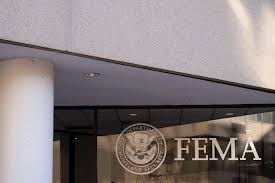A newly uncovered memo sheds light on the Trump administration’s plans to dismantle the Federal Emergency Management Agency (FEMA) and replace it with a streamlined, restructured disaster management organization. Homeland Security Secretary Kristi Noem instructed FEMA to develop the memo, which outlines steps for reducing the agency’s scope and shifting many of its functions to states and local governments.

The March 25 memo, reviewed by Bloomberg News, gives a glimpse into the administration’s vision for scaling down FEMA, although such a move would require congressional action. While President Donald Trump and Noem have publicly expressed their desire to wind down FEMA, they had provided little detail on the plans until now.
The document, titled “Abolishing FEMA,” was authored by FEMA’s then-acting administrator, Cameron Hamilton, and addressed to the Department of Homeland Security (DHS). It suggests abolishing or drastically reducing various FEMA functions, including eliminating long-term housing assistance for disaster survivors and ceasing enrollments in the National Flood Insurance Program (NFIP). These recommendations are part of a larger push to reduce the federal government’s involvement in disaster response.
While the seven-page memo had not been previously reported, the broader proposal to dismantle FEMA has continued to circulate among Trump administration officials. It remains unclear which, if any, of these recommendations will move forward.
Carrie Speranza, former FEMA advisor and now president of the U.S. Council of the International Association of Emergency Managers, warned that this shift could mean limited FEMA presence unless the disaster is of national significance, like the September 11 attacks, Hurricane Katrina, or Superstorm Sandy.
DHS, FEMA, and the White House declined to comment on the specifics of the memo, but DHS Assistant Secretary Tricia McLaughlin responded with a statement suggesting that the current FEMA system would be replaced with a more efficient, state-centric disaster response approach. “Under Secretary Noem and Acting Administrator Richardson, FEMA, as it is today, will no longer exist,” McLaughlin said.
FEMA’s Past Criticism and Future Potential Cuts
FEMA, established by President Jimmy Carter in 1979, has long faced criticism from both sides of the political aisle. Its failure to deliver timely assistance after catastrophes like Hurricane Katrina and Hurricane Maria, as well as its costly rebuilding programs, have made the agency a target for reform. With increasing concerns over the costs of disaster response—exacerbated by climate change—the Trump administration aims to make sweeping changes.
A number of new reform bills are circulating in Congress. Louisiana Republican Clay Higgins has proposed replacing FEMA with block grants to state governments, while other bipartisan bills seek to overhaul FEMA’s grant programs and reimbursement processes in order to speed up disaster recovery efforts.
The memo outlines several strategies to reduce federal spending on disaster response, including canceling long-standing initiatives, revoking some forms of financial assistance, and shifting more oversight and funding responsibilities to state and local authorities. These proposals, which echo the Heritage Foundation-led Project 2025 report, are controversial. Experts warn that they could overwhelm state budgets and lead to prolonged recovery times.
A Vision for “A Smaller Footprint”
Noem directed that FEMA’s functions be reduced to a “smaller footprint,” focusing only on core disaster-response duties. The memo proposes that FEMA continue to oversee national-level emergency preparedness and immediate disaster response. However, it suggests that the agency should stop funding for smaller, less severe events and concentrate resources on large-scale disasters.
States would likely need to cover a larger share of disaster-related costs, which could be problematic for many states that lack the budget and infrastructure to manage recovery efforts on their own.
Michael Coen, former FEMA chief of staff under President Biden, cautioned that this approach could leave many communities without the support they need. “A flood in Vermont might not be a national security concern, but it’s a huge issue for the local community,” Coen said, pointing out that many states lack the capacity to independently manage large-scale disaster recovery.
The memo also suggests a much narrower federal role in long-term recovery, proposing that FEMA cease providing housing for disaster survivors. This includes discontinuing FEMA trailers, RVs, and rental assistance for victims. Coen expressed doubts about the practicality of such a move, noting that many states are not equipped to handle disaster housing programs.
Additionally, the document critiques the NFIP, which has over 4 million policyholders, for contributing to the government’s growing debt. Given the increasing risk of flooding due to climate change, Hamilton suggested that Trump may have the authority to stop issuing new policies and renewals under the NFIP, though more legal research is needed.
The memo concludes by offering four potential new names for FEMA, including the Office of Crisis Management (OCM), the Office of Crisis Response (OCR), the National Crisis Response Agency (NCRA), and the National Office of Emergency Management (NOEM), the last of which aligns with Secretary Noem’s name.
Executive Action and Legislative Hurdles
While the memo calls for significant changes, many of the proposals would require congressional approval, such as the overhaul of housing assistance and the reform or elimination of the NFIP. However, the document suggests that some adjustments, such as scaling back disaster aid, could be made through executive action.
In April, FEMA ended a program that funded community resilience projects designed to reduce future disaster damage, one of the initiatives flagged for elimination. Additionally, a FEMA Review Council, established by Trump via executive order, is set to release its recommendations for the agency in November. However, Hamilton recommended canceling this council due to the urgency of the proposed changes.
Both Noem and Trump have reiterated their intention to phase out FEMA following the 2023 hurricane season. “Under Secretary Noem’s leadership, the FEMA Review Council is developing a comprehensive plan for necessary change,” McLaughlin of DHS stated.
The ultimate impact of these changes could hinge on how the agency responds to an unforeseen major disaster in the coming months. As Coen put it, “If a significant earthquake or hurricane strikes, the conversation about FEMA could shift dramatically.”

